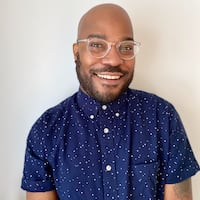In a room full of elected officials and media, Palmetto Mayor Teresa Thomas-Smith is explaining the story behind a tattoo on her arm. The message forever inked into her skin reads, “Worthy Woman.”
“Once upon a time, somebody told me I wasn’t worthy. Now I’m standing right here. I’m glad that they didn’t have the final word,” said Thomas-Smith, who is the first woman and Black person to serve as mayor in her city’s 170-year history.
During an event this week called Meet the Mayors, Thomas-Smith and seven other Black women in the metro area were honored for breaking color and gender barriers in their respective cities. Thomas-Smith was joined by mayors Marci Fluellyn (Lovejoy), Bianca Motley Broom (College Park), Donya Sartor (Jonesboro), Sandra Vincent (McDonough), Angelyne Butler (Forest Park), Rochelle Robinson (Douglasville) and Beverly Burks (Clarkston).
Credit: Ben Gray
Credit: Ben Gray
According to a recent study from the Center for American Women and Politics, of those considered mayors or performing mayoral duties in U.S. cities, towns and minor civil divisions, just over 25% are women. That number is even lower for Black women. An event like Meet the Mayors helps those actively working in public service, but can also help counter stigma voters might have about trusting politicians and the competency of Black women leaders.
“It’s a reality for all of us, the notion that when Black people, Black women are in charge — as my city said to me — that it was going to hell in a hand basket.” said Vincent, the first woman and Black person to serve as mayor of McDonough. “Our mission is to prove them wrong.”
The program, moderated by former U.S. development diplomat and political strategist Mariama Keita-Thiero, involved all eight women discussing challenges and successes in their cities. Event organizer Ricky McKenzie says he got the idea after talking with Sartor and Motley Broom. As a resident of unincorporated Lithia Springs, McKenzie didn’t know who his government leaders were and worried that was the case for others, particularly those with Black mayors. Initially, he was only going to focus on Sartor and Motley Broom.
Once others, including Thomas-Smith, found out about the event, McKenzie started getting calls from residents, staff and the mayors themselves to be included. That the event took place between Black and Women’s History Month was a plus. “It was not something I set out to do, but it morphed from there,” he said.
After hosting an over-capacity crowd in College Park, McKenzie said he’s been asked to put another Black mayor meet-up event together, but wants to hold off for now. However, the eight women plan on keeping the conversations going and bringing others into the spotlight.
During the panel discussion Butler highlighted the importance of Black women coming together in a country rife with division. They’ve experienced many of the same issues. “We wanted to make the other know that we are going to be that support, that trust system,” she said. “You don’t have to sit in it alone.”
About the Author
The Latest
Featured


